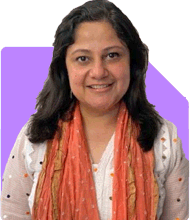Anu Krishna |1757 Answers |Ask -Follow
Relationships Expert, Mind Coach - Answered on Aug 01, 2023
The co-founder of Unfear Changemakers LLP, she has received her neuro linguistic programming training from National Federation of NeuroLinguistic Programming, USA, and her energy work specialisation from the Institute for Inner Studies, Manila.
She is an executive member of the Indian Association of Adolescent Health.... more

My daughter is getting married to her boyfriend in a few months. She has never lived away from us. She is not telling us much hoping not to worry us but I can sense that something is bothering her. How can I help her?
Every parent/s of a daughter feels what you are feeling at this moment...
They worry and have apprehensions about how their daughter will be able manage without them and shoulder responsibilities in a marriage.
It's natural to go through these bouts of anxiety but the bets way is to trust that your upbringing and value system is what she has imbibed and that she is going to have a great life.
But if you are sensing something that is bothering her, I would not go past it and ask her about it. She may say that it's nothing just so that you are not worried, but do persist in a gentle way. If she has second thoughts about the marriage, tell her that it's okay and that you will support whatever her decision might be.
Whatever that it is, it's always a comfort and safe zone when children know that their parents are with them unconditionally. So, sit her down and simply encourage her to speak her heart out...
All the best!
You may like to see similar questions and answers below
Anu Krishna |1757 Answers |Ask -Follow
Relationships Expert, Mind Coach - Answered on Jul 22, 2022
Anu Krishna |1757 Answers |Ask -Follow
Relationships Expert, Mind Coach - Answered on Jun 09, 2021
Dr Aarti Bakshi | Answer |Ask -Follow
Child and Parenting Counsellor - Answered on Jul 20, 2023
Kanchan Rai |648 Answers |Ask -Follow
Relationships Expert, Mind Coach - Answered on Jul 15, 2024
Anu Krishna |1757 Answers |Ask -Follow
Relationships Expert, Mind Coach - Answered on Nov 18, 2024
Reetika Sharma |454 Answers |Ask -Follow
Financial Planner, MF and Insurance Expert - Answered on Dec 24, 2025
Reetika Sharma |454 Answers |Ask -Follow
Financial Planner, MF and Insurance Expert - Answered on Dec 24, 2025
Reetika Sharma |454 Answers |Ask -Follow
Financial Planner, MF and Insurance Expert - Answered on Dec 24, 2025
Reetika Sharma |454 Answers |Ask -Follow
Financial Planner, MF and Insurance Expert - Answered on Dec 24, 2025
Reetika Sharma |454 Answers |Ask -Follow
Financial Planner, MF and Insurance Expert - Answered on Dec 24, 2025
Reetika Sharma |454 Answers |Ask -Follow
Financial Planner, MF and Insurance Expert - Answered on Dec 24, 2025
Reetika Sharma |454 Answers |Ask -Follow
Financial Planner, MF and Insurance Expert - Answered on Dec 24, 2025
Samraat Jadhav |2523 Answers |Ask -Follow
Stock Market Expert - Answered on Dec 24, 2025
Reetika Sharma |454 Answers |Ask -Follow
Financial Planner, MF and Insurance Expert - Answered on Dec 24, 2025
Reetika Sharma |454 Answers |Ask -Follow
Financial Planner, MF and Insurance Expert - Answered on Dec 24, 2025


























